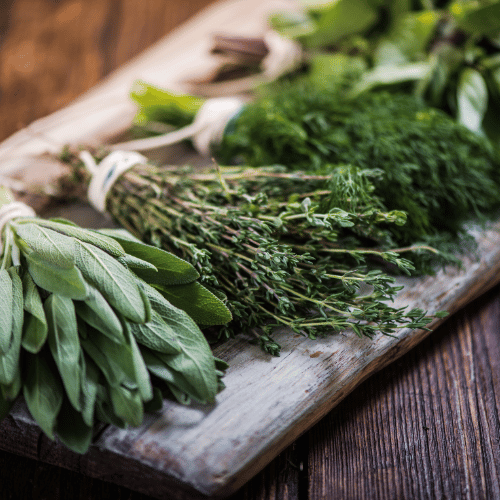7 Herbs Avoid to Maintain a Full Breast Milk Supply?
Breast milk is an essential source of nutrition for newborns, and it's crucial for breastfeeding mothers to maintain a healthy milk supply. While breastfeeding, it's important to be mindful of what you consume, as some foods and over-the-counter medications can reduce breast milk production. In this blog post, we'll explore some of the common herbs that breastfeeding mothers should avoid to maintain a healthy milk supply. This is not a comprehensive list, but highlights some herbs known to reduce supply.
Herbs:
1) Sage
Sage is a popular herb used in many dishes, but it can also reduce milk supply. Avoid consuming large amounts of sage can reduce milk supply, it is very unlikely normal dietary intake as a seasoning will reduce supply.
2) Peppermint
For women who are breastfeeding, consuming large amounts of peppermint may lead to a decrease in milk production. Peppermint contains compounds that have a drying effect on the body, including the mammary glands. It is believed that these compounds may interfere with the production of prolactin, which can lead to a decrease in milk production. Avoid consuming peppermint tea, mints, or any other products that contain peppermint.
3) Parsley
Parsley is an herb that has been traditionally used for medicinal purposes and as a culinary spice. While there is limited scientific evidence to support its effectiveness or safety for decreasing milk supply, parsley is believed to have an effect on prolactin levels, a hormone responsible for milk production.
Parsley contains compounds that are believed to have a drying effect on the body, including the mammary glands. It is believed that these compounds may interfere with the production of prolactin, which can lead to a decrease in milk production.
4) Oregano
Oregano contains compounds called carvacrol and thymol, which are known to have antimicrobial properties. It is believed that these compounds may interfere with the production of prolactin, which can lead to a decrease in milk production. Breastfeeding mothers should avoid consuming large amounts of oregano or taking it as a supplement.
5) Lemon Balm
Lemon balm is an herb that is often used in teas and supplements. While there is limited scientific evidence to support its effectiveness or safety for decreasing milk supply, lemon balm is believed to have an effect on prolactin levels, a hormone responsible for milk production. It contains a natural compound called eugenol, which can decrease milk production. Breastfeeding mothers should avoid consuming large amounts of lemon balm or taking it as a supplement.
6) Black Walnut
Black walnut is an herb that has been traditionally used to decrease milk supply in breastfeeding mothers. While there is limited scientific evidence to support its effectiveness or safety for this purpose, it is believed that black walnut works by reducing the production of prolactin, a hormone that is responsible for milk production.
Black walnut contains a compound called juglone, which is believed to have an effect on prolactin levels. Juglone has been shown to inhibit the release of prolactin from the pituitary gland, which can lead to a decrease in milk production. However, more research is needed to determine the safety and efficacy of black walnut for decreasing milk supply.
While black walnut has been traditionally used for this purpose, it should be used with caution as it may have negative effects on your milk supply or your baby's health.
7) Rosemary
Rosemary is an herb that is often used in cooking and has been traditionally used for medicinal purposes. There is some evidence to suggest that rosemary may have an effect on milk supply in breastfeeding mothers.
Rosemary contains compounds that are believed to have a drying effect on the body, including the mammary glands. These compounds may interfere with the production of prolactin, a hormone that is responsible for milk production. When prolactin levels are reduced, milk production may decrease. While rosemary has been traditionally used to decrease milk supply, there is limited scientific evidence to support its effectiveness or safety in this regard.
It's important to note that not all herbs have a negative impact on milk production. In fact, some herbs like fenugreek and milk thistle are believed to increase milk supply. If you are a breastfeeding mother and are experiencing a decrease in milk supply, it's important to talk to a healthcare provider or a lactation consultant before using any herbs or supplements to try to increase or decrease milk production. They can help you determine the best course of action based on your individual circumstances and the needs of your baby. It's also important to remember that while some herbs and supplements may have the potential to increase or decrease milk supply, their safety and effectiveness can vary, and not all remedies may work for everyone.
Need help increasing your milk supply? Talk to one of our lactation consultants today!
I am a registered nurse in the State of Florida and an International Board Certified Lactation Consultant (IBCLC). The content on this blog page is for informational and educational use only. I have taken reasonable steps to ensure that the information shared is accurate, but I cannot guarantee that it is free from errors. The information shared here does not take the place of a medical provider, nor establishes any kind of client relationship with myself as a registered nurse or a lactation consultant. I am not your IBCLC or RN unless you book a consult with me directly and we establish a patient/caregiver relationship.

